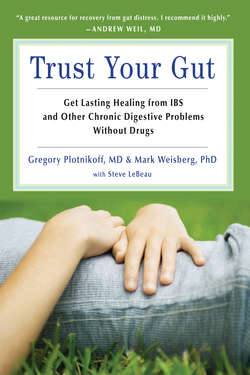Читать книгу Trust Your Gut - Gregory Plotnikoff - Страница 7
На сайте Литреса книга снята с продажи.
Maria's Helplessness
ОглавлениеMaria, a married mother of three teenagers, worked full time in a busy office downtown. One day she began to feel pains in her abdomen, followed by a severe bout of diarrhea. She figured it would go away, like it always had before.
“I was too busy to care about me,” she said.
But it didn't go away. It got worse. The diarrhea started alternating with periods of constipation. She couldn't predict what she would experience next. She began missing meetings at work because she was in the restroom. Some days she would call in sick “just in case.”
When she realized she was distancing herself from her family and friends, she went to see her primary care physician. She examined Maria and ran all the appropriate diagnostic tests but couldn't find anything physically wrong. She also assessed her for depression, anxiety, post-traumatic stress disorder, and excessive stress. Maria's doctor recommended fiber and gave her a referral to see a gastroenterologist (GI specialist). The GI specialist gave Maria a colonoscopy and several other tests to rule out serious physical pathology. “The results are all negative,” said the specialist. “This means that your symptoms are not due to something serious like cancer or inflammatory bowel disease. Your symptoms are due to irritable bowel syndrome, or IBS.”
She then discussed lifestyle changes and stress reduction, and reviewed the range of prescription drugs that might be helpful. She also suggested that Maria might benefit by seeing a psychologist to address some of the stresses affecting her symptoms. Maria was concerned about the drug recommendations because of her previous sensitivity to medications. And the suggestion to see a psychologist pressed the wrong button in her. Now Maria was really scared. “They think I'm crazy,” she said to herself. “They think it's all in my head.”
The psychologist could not solve her problem either. “It is true that severe depression or acute anxiety can cause intestinal problems,” he told Maria, “but I don't think you have psychological issues significant enough to warrant treatment. A psychiatrist might prescribe something to help you relax, but otherwise I don't think my services would be helpful for you at this time.”
Maria was back where she started, only worse. She made the rounds of seeing different doctors and getting prescriptions that treated her symptoms, but she felt no hope for successful treatment. “I've been scoped from both ends and told that not much can be done for me,” said Maria. “Yet I still have pain and gastric distress. What now?”
What Maria didn't realize was that she wasn't the only one who felt frustrated and helpless. The health professionals who see patients like Maria often feel frustrated by their limited impact on problems like hers. This can be true even for GI specialists, the physicians with the most training in gastrointestinal diseases. They are the ones we go to for evaluation for the most serious or life-threatening diseases, such as gastrointestinal cancer and inflammatory bowel disease. They have the technologies for diagnosis of organic or structural diseases. But even they get frustrated by the severe suffering experienced by those who have unexplained symptoms, what is termed functional bowel disease. In spite of the diligent and caring work of GI specialists, Maria and millions of others can't find relief for their chronic digestive distress. Can't anything be done for them?
That's where we enter the picture. Greg Plotnikoff is an MD and a leader in the field of integrative medicine who spent six years in Japan studying traditional medicine. Mark Weisberg is a PhD psychologist who specializes in the treatment of chronic pain and the emerging field of clinical health psychology. Our novel approach extends the range of standard practice in both medicine and clinical psychology. We share a holistic vision of how the body and mind work together, a perspective that allows us to see new ways to solve old problems. As recently as ten years ago, our holistic approach would have been marginalized by the medical profession. These days we are the go-to doctors that other doctors refer their patients to when they run out of answers. We wrote Trust Your Gut to share our answers with you, so you can help yourself. This book will help you free yourself from your chronic misery.
